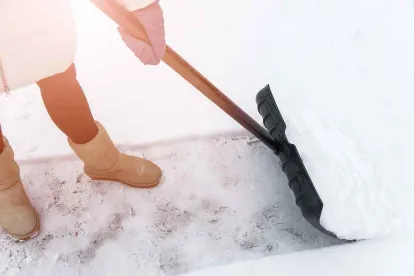In a 5‒2 decision, the New Jersey Supreme Court adopted the “ongoing storm rule,” aligned with the majority rule and 10 other states. Over the years, New Jersey backtracked from not imposing a duty on commercial property owners for slip and falls on snow and ice during an active winter weather event, to imposing a duty if after actual or constructive notice property owners had not acted in a reasonably prudent manner under the circumstances to remove and reduce the hazard. New Jersey’s highest court now holds commercial landowners do not have a duty to remove snow and ice until the conclusion of a storm, unless unusual circumstances give rise to a duty before then.
Background
For many years, commercial landowners, even those able to contract with independent contractors to provide snow and ice removal services, have struggled with the impossible task of clearing all snow and ice while precipitation continues. The task of “catch it while it falls” has proven to be virtually impossible. Prior to the court’s latest decision, a commercial property owner was straddled with the unmanageable undertaking of clearing during a storm and then attempting to convince a jury that their efforts were reasonable under the circumstances. The question of reasonableness was always a question for the jury.
In Alberto Pareja v. Princeton International Properties, the plaintiff slipped and fell while walking to work in the early morning hours. Snow and rain had fallen overnight with below-freezing temperatures. The trial court granted summary judgment to the commercial property owner, finding the property owner owed no duty to maintain its sidewalks during the precipitation. The Appellate Division reversed and rejected the ongoing storm rule, holding the commercial property owner had a duty of reasonable care to maintain the sidewalk, even while precipitation was falling.
The Ruling and Exceptions
On June 10, 2021, in Pareja, the Supreme Court of New Jersey adopted the ongoing storm rule, stating that commercial landowners do not have the absolute duty, and the impossible burden, to keep sidewalks on their property free from snow or ice during an ongoing storm. The court defined two unusual circumstances or exceptions to the ongoing storm rule that could impose a duty.
-
The first exception to the rule is if the owner’s conduct increases the risk to pedestrians and invitees on their property. For example, if the commercial landowner creates an “unusual circumstance” where the defendant’s conduct exacerbates and increases the risk of injury to the plaintiff.
-
The second exception to the rule is if the dangerous condition is preexisting. For example, if a commercial landowner failed to remove or reduce a preexisting risk on the property, including the duty to remove snow from a previous storm that has since concluded, the owner may be liable for an injury during a later ongoing storm. The rule does not preclude a jury from hearing questions of fact, including when the storm concluded or whether the accumulation of snow or ice was from a previous storm.
In Pareja, the court did not find any unusual circumstances that would impose a duty on the commercial property owner. Mr. Pareja slipped and fell on an icy sidewalk that was not a preexisting condition, but rather a result of the ongoing storm.
The premise of the ongoing storm rule is that it is categorically inexpedient and impractical to remove or reduce hazards from snow and ice while the precipitation is ongoing. Connecticut, Delaware, New York and Pennsylvania are among the other 10 states that have adopted the ongoing storm rule; all have similar climates to New Jersey.




 />i
/>i
